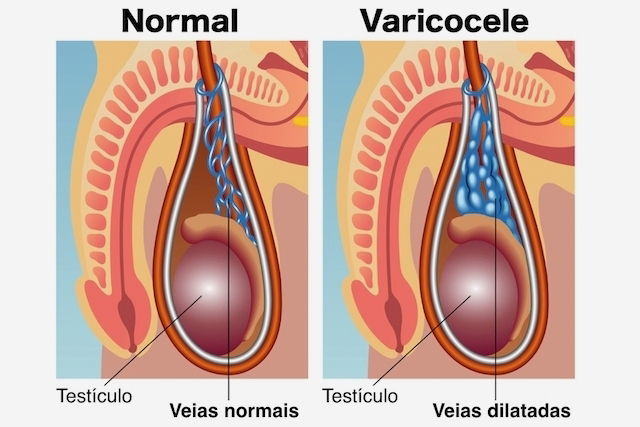A varicocele is a dilated vein in the testicle, where blood can start to accumulate. It is associated with symptoms such as pain, a feeling of heaviness and swelling in the area. It most commonly affects the left testicle, but it can appear on either side. It can even affect both testicles at the same time, which is medically referred to as a bilateral varicocele.
A varicocele can lead to infertility, as the accumulation of blood can reduce sperm production and sperm quality. Therefore, if you suspect you may have one, you should consult a urologist to initiate the most appropriate treatment and prevent complications.
Varicoceles can be repaired through surgery, but not all cases can will restore fertility, especially if there is already damage to any surrounding tissues.

Main symptoms
The most common symptoms of varicocele may include:
- Testicular pain, which can be mild to moderate
- Pain that improves when lying on your back
- Swelling or presence of a lump in the testicles
- Testicular heaviness
- Infertility
Some varicoceles do not present with any symptoms, and are only be diagnosed through a routine exam with the urologist.
Also recommended: Testicular Pain: 11 Causes (& How to Treat) tuasaude.com/en/testicle-painCommon causes
Varicoceles are most commonly caused by a defect in the valves inside the veins that present in the scrotum above the testicles. These valves are responsible for regulating blood flow to and from the testicles.
Therefore, when blood flow does not occur normally and the blood backs-up, the veins start to expand or dilate, resulting in a varicocele.
Also recommended: Lump on Testicle: 7 Common Causes & How to Treat tuasaude.com/en/lump-on-testicleConfirming a diagnosis
Varicoceles can be identified by the doctor through palpation of the testicles. This exam should be done both lying down and standing up, since in some cases the varicocele may not be felt in certain positions. Therefore the evaluation should be done in more than one position.
However, it may also be necessary to perform an ultrasound to better visualize the affected area and surrounding tissues.
Treatment options
Treatment for a varicocele is generally only recommended when it causes symptoms. Varicoceles with that cause intense pain or swelling can be treated with painkillers (like ibuprofen or acetaminophen) or the use of testicular braces.
Men who present with cases of infertility, pain that does not improve, or problems with testicular function, surgical intervention may be necessary. This procedure is referred to as a varicocelectomy and can help to resolve the problem permanently.
Varicocele surgery
This type of surgery can be performed in 3 different ways:
- Open surgery: this is the most classic type of surgery in which the doctor makes an incision in the groin area to observe the varicocele and tie a "knot" in the affected vein. This allows for the blood to circulate only through the healthy veins.
- Laparoscopy: this is similar to open surgery, but in this case the doctor makes small incisions in the abdomen and inserts thin tubes through which he repairs the varicocele.
- Percutaneous embolization: this is a less common technique in which the doctor inserts a tube through a vein in the groin to the site of the varicocele, and then releases a fluid that closes the dilated varicocele vein.
Depending on the type of surgery used, the recovery time may vary. An open surgery takes the longest to recover from, followed by a laparoscopy and then an embolization.
With any type of surgery, slight pain may occur, so you should wear comfortable underwear and apply ice to the area for the first 24 hours. You can return to normal activities after about 10 days or as directed by your doctor.
Possible complications
Testicles that contain a varicocele may start to decrease in size and become softer over time, losing their function. Although the specific cause of a varicocele is unknown, it is possible that it they are related to changes in the temperature of the area, the presence of free radicals near the testicles, or also increased pressure in the area.
if the accumulation of blood in the varicocele causes an increase in the temperature around the testicles, it is also possible that the quality of the sperm will be affected, even in the unaffected testicle, which can lead to infertility.






























